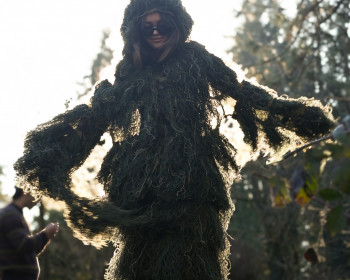Students research the “Great War” in Austria and Hungary
Open gallery

During the summer, Lewis & Clark students continue to work hard in their fields of study. By collaborating with faculty on research projects, students are able to engage their curiosity, expand their learning, and prepare for life after college, all while making meaningful contributions to scholarship.
Musa Ahmed ’14 and Dana Bronson ’14 are working with Associate Professor of History Maureen Healy to answer a series of historical questions about World War I. While most scholarship has focused on the western front, the research team wanted to look into the “Great War” in Austria and Hungary. In the following Q&A, the team members reflect on their experience.
What are you researching? What question or problem are you trying to answer/solve with your research?
With the 100th anniversary of World War I approaching, we are seeking to revise the geographic imbalance of studying the western front instead of places like Austria-Hungary and the greater Habsburg empire. We are working on a piece that Maureen will be presenting at the Kreisky Archive for Contemporary History in Vienna in the fall. By drawing on a vast base of primary and secondary sources, we are trying to map and recreate the mood of Vienna one month before the outbreak of World War 1. Much of the literature on World War 1 speaks about the beginnings of the war as “unexpected,” or breaking out like “a clap of thunder.” We are seeking to test this historical trend within the confines of Vienna.
Does your research have any potential applications in the real world, or will it influence other work in your field?
Our article that will appear in 1914-1918: The International Encyclopedia of the First World War will be available to a worldwide audience. The project is based in Berlin and they have recruited scholars from around the world. It will hopefully aid others in their future research on the wartime Habsburg empire.
Is any of your research taking place off campus? If so, what’s that experience like?
Most of our research is limited to the confines of Watzek Library. However, we are hopeful we might be able to attend the Berkshire Conference on the History of Women next spring in Toronto with Maureen to present some of our findings.
What first sparked your interest in this research area?
We had the pleasure of taking the History 400 colloquium with Maureen last spring on the topic of World War 1. Many of the questions we grappled with in our research came up frequently throughout our class together. It is rewarding for us as students to build a bridge between our work in the classroom and our research this summer with a renowned professor of World War 1.
How has working closely with faculty influenced your education?
We’ve been able to exercise some of the tools we have gained, not only in colloquium, but throughout our time as students at Lewis & Clark. Our collaborative efforts this summer have helped us gain the skills needed to work as a team to produce quality scholarship. Not only have we been given the opportunity to research and write original scholarship under the guidance of a professor, but we have also been included in the peer review process of the works of other scholars.
How do you hope your experiences this summer will impact your future studies or professional pursuits?
We’re both seniors, so we are looking forward to using our newfound skills when we begin to write our history theses. Beyond that, this unique experience will be very beneficial as we continue on at the graduate level.
About the program
The Mellon Foundation grant provides funds to help faculty infuse collaborative research into a broad range of new and existing courses, and supports an increased number of student-faculty summer research projects.
“We firmly believe that engaging students in the practice of their discipline is the best way to prepare them for life beyond the college,” said Tuajuanda Jordan, dean of the College of Arts and Sciences. “Student-faculty research is seen as one of the strengths of our educational experience, and with this grant we can ensure that students have access to this type of opportunity.”
With this support, The Andrew W. Mellon Foundation continues its long legacy of supporting and enriching the arts and humanities at Lewis & Clark.
Zibby Pillote ’14 contributed to this story.
More Newsroom Stories
Public Relations is located in McAfee on the Undergraduate Campus.
MSC: 19
email public@lclark.edu
voice 503-768-7970
Public Relations
Lewis & Clark
615 S. Palatine Hill Road MSC 19
Portland OR 97219

